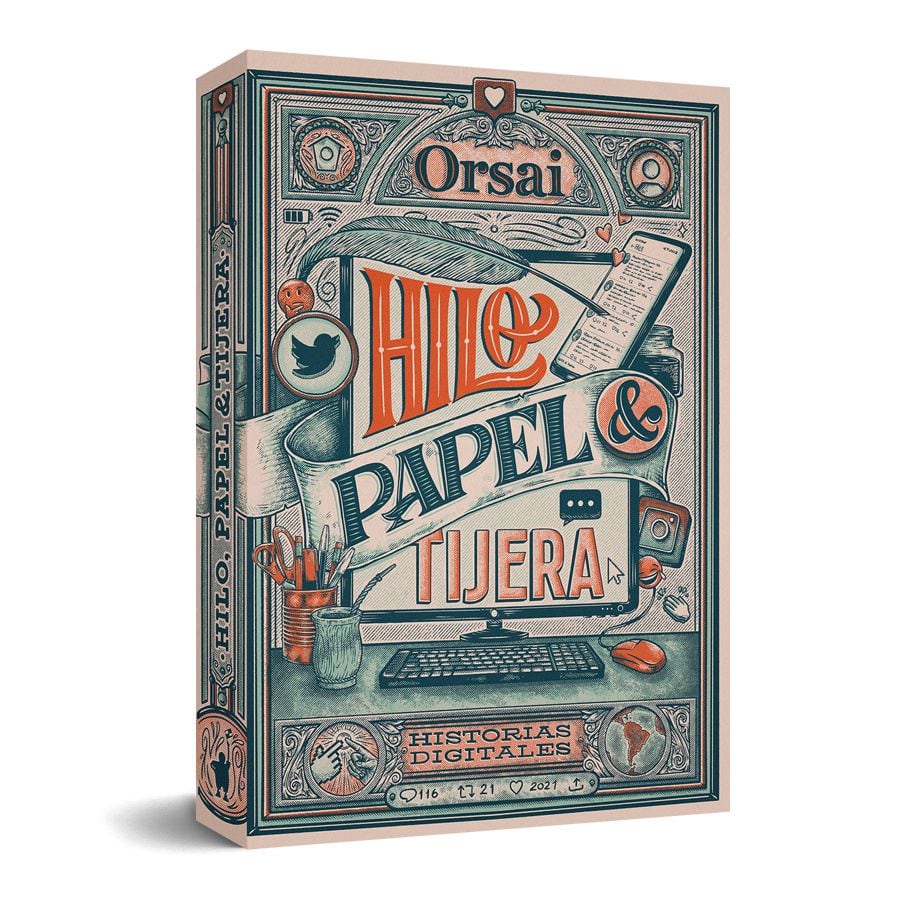
Day by day, in times of hyperconnectivity, social networks and internet forums are consolidated as platforms for literary creation; occasional and brief publications opened up microblogging, allowing the development of various topics in a transversal way.
Some blogs on the internet persevere in their form and extent to address everything from pop-culture polemics, to complicated dissertations made, not by cyberspace curious people, but by real specialists in an exercise whose sole purpose is to share knowledge by writing for free to generate debates and conversations.
For more than 10 years, Orsai Publishing House has been committed to a business model in the literary world that stimulates creation, prioritizing the entry of economic resources to authors. His most recent project is 'Thread, paper and scissors (digital stories) ', an anthology of different threads published on Twitter in 2021, one of the most booming formats at the moment, in which a sequence of united trills make up a story; this publication also has writings found on Facebook and Instagram, as well as in blogs and on Medium, a popular blog publishing service created by the founders of Twitter, which is characterized by being a kind of hybrid of professional and non-professional contributions.
Have you felt that something you read on the internet has a higher value in your language, development and argumentation? That was precisely one of the reflections that gave life to this initiative: “To think that something written on Twitter is necessarily less rigorous than another medium is something capricious. Drawing an analogy, it's like thinking that a movie is necessarily more sophisticated if we see it in the cinema than on a television. I think that social networks are not only a source of great readings, but they have a language of their own and that is what we try to bring to paper to give it an identity of our own, a little further from vertigo” said Ignacio Merlo, Editorial Orsai coordinator, emphasizing the importance of bringing this format of texts closer to audiences that are far from digital environments.

This publication deals with different topics, the common denominator of which are interesting stories, exciting in their reading and with a particular ability to connect with readers, as commented Martín Castagnet, literary editor of the project “when we put together the call for the book we opted for fiction texts or that can be read as such. At the end of the day we don't give a damn about whether what is said was true or not, only what it transmits to us.” .
'Thread, paper and scissors (digital stories) 'represents a unique edition, highlighted by the detail in every aspect of its production, it is a luxury text edited by the staff of Orsai Magazine in Argentina, accompanied by the work of the artist Emiliano Renzi in charge of the cover and 256 pages of texts written by authors from all over Latin America, mainly from Argentina, many with a digital community that supports them and that have given them recognition in their children, others who only write with the mere interest of sharing their ideas on the internet “I think this project demonstrates the number of authors on the internet who write with skill and talent, and who don't they published on paper solely because of lack of opportunities,” added Castagnet.
Colombian Jonathan Acevedo is one of the authors participating in this anthology, journalist, creative and audiovisual producer who focuses mainly on world pop culture to develop interesting Twitter threads on this platform with his username @silaprieto “although it seems like a very simple format, it is actually very revolutionary when it comes to narrating, telling stories and not only in news events that deserve to be followed over time, but also that ability to create fiction and non-fiction stories with continuity from start to finish and thanks to Twitter's resources to strengthen the narrative (images, video, gifs) giving storytelling an opportunity to deepen creation and showing great effectiveness in communicating what you want to communicate”, commented Acevedo, who added to this initiative with a Twitter thread with the story of an uncle of his who lived homosexuality in the family environment from the author's perspective “I also approach my vision as gay by doing a parallel, narrating how I see my close and not so close family relate to this fact, the reunion after this phase of the pandemic with them and with my uncle who is now suffering from cancer. It is a very personal text that also helped me to reflect on my sexuality, of belonging to the family I am in, of being Colombian, also on how that perception permeates what one is and wants to be, for me it is an honor to be part of such a project...”

The group of selected authors is composed of the stories of Jonatan Acevedo, Andrea Aguilar Calderón, Juan Pablo Barrera, Enriqueta Barrio, Juan Barrionuevo, Santiago Barzizza, Leonardo Berneri, Nicolás Binaghi, Macarena Castelao, Ignacio Champane, Aylén Costantini, Claudia Costanzi, Uriel De Simoni, Heriberto Duarte, Victoria Figuarte Eiras, Juan Pablo Fiorenza, Maria François, Marta Garcia, Juli Giampaoli, Maria Laura Grillo, Thomas Hodgers, Felicitas Irastorza, Caesar Juno, Dan Lande, Juan Pablo Manzo, Oscar Marful, Ivo Marinich, Alexander Marrero, Paul, Monaco, Christian Olmos, Diego Petruszynski, Abi Powell, Elio Puntieri, Daniel Rescheri Federico Rodriguez, Martin Salvador, Mariela Scida Danon, Daniela Silva, Marcos Stábile and Ricardo Velazquez.
On this occasion, the publisher allocated 50% of the gross proceeds from the sale of the book to be allocated to authors (40% more than what traditional publishers pay), in order to achieve a higher sales rate and, consequently, a greater economic impact that favors the literary production of minds behind these stories “is a way of encouraging writing and rewarding those who started writing without expecting anything in return, Orsai has been sustainable for more than a decade without having to resort to the old ideas of advertising or subsidies. We understand that cutting the income of the authors of the texts for their own benefit undermines the quality of the final work.” ratified Merlo.
After these years, this editorial has been supported by readers, demonstrating that collaborative and independent models have a future, but that they also possess credibility and are economically viable, as commented by Martín Felipe Castagnet, editor of the publication “we do it because we can, and we can only because readers accompany. That trust, first blindly and then backed up by our books, magazines and projects of all kinds, includes a pact that is not implicit: the certainty that we try to give both the author and the reader the best we can.”
Orsai published 'Thread, Paper and Scissors (Digital Stories) ', following the launch in 2021 of the collection' Disruptivos', made up of the books' Garche ', by Juan Sklar; 'The Awakens', by Matías Fernández Burzaco and' Melting ', by Daniel Mella, addressing everything that cannot be said about topics such as violence, sex and disease.
The final result of this successful call (which received more than two thousand applications from all over the Spanish-speaking world, added to the search implemented by the editorial team) is now on sale online and is widely disseminated on these digital channels that seek to honor as spaces for collective creation to stimulate reading and to bring new publications to paper to grow the world of letters, ideas and stories that deserve to be read.
Últimas Noticias
Debanhi Escobar: they secured the motel where she was found lifeless in a cistern
Members of the Specialized Prosecutor's Office in Nuevo León secured the Nueva Castilla Motel as part of the investigations into the case

The oldest person in the world died at the age of 119
Kane Tanaka lived in Japan. She was born six months earlier than George Orwell, the same year that the Wright brothers first flew, and Marie Curie became the first woman to win a Nobel Prize

Macabre find in CDMX: they left a body bagged and tied in a taxi
The body was left in the back seats of the car. It was covered with black bags and tied with industrial tape
The eagles of America will face Manchester City in a duel of legends. Here are the details
The top Mexican football champion will play a match with Pep Guardiola's squad in the Lone Star Cup

Why is it good to bring dogs out to know the world when they are puppies
A so-called protection against the spread of diseases threatens the integral development of dogs




